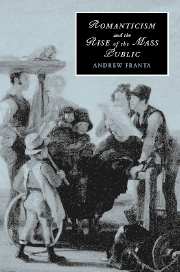Book contents
- Frontmatter
- Contents
- Acknowledgments
- Introduction: The regime of publicity
- 1 Public opinion from Burke to Byron
- 2 Wordsworth's audience problem
- 3 Keats and the review aesthetic
- 4 Shelley and the politics of political poetry
- 5 The art of printing and the law of libel
- 6 The right of private judgment
- Notes
- Bibliography
- Index
- CAMBRIDGE STUDIES IN ROMANTICISM
6 - The right of private judgment
Published online by Cambridge University Press: 22 September 2009
- Frontmatter
- Contents
- Acknowledgments
- Introduction: The regime of publicity
- 1 Public opinion from Burke to Byron
- 2 Wordsworth's audience problem
- 3 Keats and the review aesthetic
- 4 Shelley and the politics of political poetry
- 5 The art of printing and the law of libel
- 6 The right of private judgment
- Notes
- Bibliography
- Index
- CAMBRIDGE STUDIES IN ROMANTICISM
Summary
“How do you mean – the right Mr. Tennyson?”
“The great Mr. Tennyson, miss. I don't know if you are familiar with the work of the great Mr. Tennyson? He wrote ‘The Boy Stood on the Burning Deck.’”
P. G. Wodehouse, The Luck of the Bodkins (1935)The preceding chapters have been concerned to show how such diverse cultural institutions as public opinion, the periodical reviews, political opposition, and the law of libel mediate between poets and their readers in early nineteenth-century England. I have argued that, in various ways, Romantic poetry and poetics were shaped by their engagement with the mass public, and that the regime of publicity at once put new pressure on poets (by alerting them to the changed nature of the audience for poetry) and offered them new models for addressing readers and conceptualizing the public. As a kind of coda to the argument developed to this point, I now turn to the 1820s (in many ways, a lost decade for literary history) to examine two important attempts to relate poetry to the public as the Romantic period comes to an end and the Victorian period begins. This chapter argues that reviewers' hostile reactions to Alfred Tennyson's early poetry and the rise and fall of Felicia Hemans's critical reputation each represent a version of what I have described as feedback effects – in which the circumstances of poetry's reception become a crucial condition of poetic composition.
- Type
- Chapter
- Information
- Romanticism and the Rise of the Mass Public , pp. 165 - 185Publisher: Cambridge University PressPrint publication year: 2007



